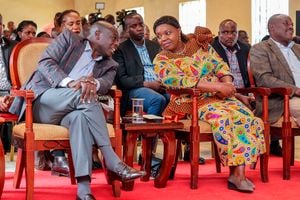The atrocious treatment we mete out to our law enforcement officers

Vigilance House, the police headquarters, on April 27, 2018. Men and women who give their all to keep us safe are deliberately and relentlessly dehumanised, deprived of all humane amenities and denied every consideration due to people who do honest work.
What you need to know:
- Senior police officers have devised access to makeshift VIP culture while the lowest ranks literally subsist like animals.
- The pathetic vulnerability of policemen and women, coupled with immense public expectation of efficient professional service, must be oppressive to them.
It must have been 2005. I was much younger then, and the men seated at the waiting room were younger than me. One was genial and forthcoming.
His partner was morose, seemingly held together by chords of defiant sorrow. So far he had neither uttered a word nor taken his gaze from his shoes.
He was the reason they had come looking for legal advice. “Sisi ni askari. Tunafanya kazi na yeye” (We are police officers and this man is our colleague.)
What I heard that afternoon is totally unforgettable.
The laconic officer held forth in diction richly infused with a rich Ameru accent.
His rich melodious inflections and syncopated intonation rose up like an upthrust of bountiful petrichor off the volcanic slopes of Mt Kenya.
He had a heavily grounded name that wanted to be taken seriously. Like Gideon Nthamburi or Gershom Anampiu.
He was a newly posted officer, and his station served the teeming slum of Langas in Eldoret, and its environs.
Rallied and resisted
One evening, he was on patrol duty with his partner, lugging their rifles, plodding the unlit, unpaved alleys when a gang ambushed them. The young men rallied and resisted, denying them the guns they clearly wanted.
One thug took out a knife and made to stab Anampiu’s throat.
He buried it in the back of the neck instead.
His partner shook off his assailants, opened fire and the thugs fled into the darkness beyond.
Anampiu fell unconscious, hugging his rifle.
He was rushed to the referral hospital where emergency surgery saved his life.
The knife had sliced clean through the back of his neck, under his jaw and come out through his eye, damaging it so severely it had to be taken out altogether.
After many weeks of recovery, Anampiu returned to work.
Misfortune promptly forgotten
He was immediately assigned duty, and his misfortune promptly forgotten. But there was a problem.
Emergency surgery had removed Anampiu’s eye, but his tear glands remained in the socket, and they dripped and flowed endlessly.
It was taking a toll on the man’s self-confidence and exposing him to the risk of infection.
Anampiu said he had submitted the paperwork required for him to access compensation arising from injury in the course of work, but the money had not reached him.
His strenuous follow-up indicated the money had been processed, yet the funds had developed a mystifying viscosity.
Anampiu therefore needed a safe strategy to get his money quickly out of the bureaucratic labyrinth, so that he could pay for corrective surgery to stop the tears.
We agreed on the following course of action: He would take one more trip to Nairobi to try and establish the exact position of his compensation.
For this purpose, we drafted a very decorous letter requesting expeditious attention to his matter for understandable medical emergency.
Statutory notice
In the meantime, I would prepare a statutory notice to be served on the Attorney-General setting out Anampiu’s intention to sue the government.
A few months later, Anampiu and his partner came calling again.
He had established for a fact that his funds were paid out well before he was discharged from hospital.
The person who had received the money was not familiar to him.
He had the option of following up on the matter and most definitely losing his job, and probably getting into administrative problems for insubordination, desertion and the suchlike.
Or he could return to his post, and Vigilance House was happy to order that he be assigned eight-to-five desk duties for the rest of his service.
Anampiu had come to let me know that this was the end of the matter as far as he was concerned, and he was instructing me to stand down.
I gave him his and the Attorney-General’s copies of the notice, and he tore them up.
I marked the file as closed, and Anampiu rose from his seat and marched out of my chambers, proud, defiantly erect, determined.
Under the bludgeoning of fate, his head was bloodied but unbowed.
He has haunted me every day since.
Not to put too fine a point to it, our country treats police officers atrociously.
Relentlessly dehumanised
Men and women who give their all to keep us safe are deliberately and relentlessly dehumanised, deprived of all humane amenities and denied every consideration due to people who do honest work.
This has given rise to a hierarchy of inhuman abuse, whereby senior police officers have devised access to makeshift VIP culture while the lowest ranks literally subsist like animals.
In the past few weeks, we have all witnessed the humiliating mistreatment of female officers, the deadly explosion of psychosocial malaise and daylight robbery of policemen at work.
The pathetic vulnerability of policemen and women, coupled with immense public expectation of efficient professional service, must be oppressive to them.
A decade into a dispensation of constitutionally entrenched police reforms, we haven’t come anywhere close to drying poor, selfless Anampiu’s tears.
The writer is an advocate of the High Court and a former State House Speech Writer; @EricNgeno





